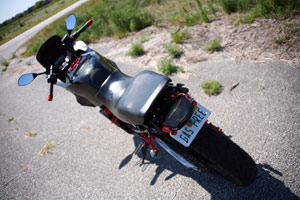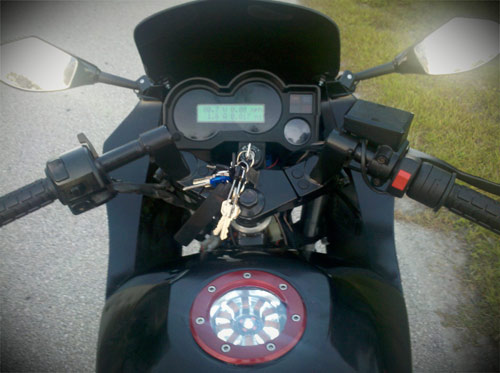Why build an electric motorcycle? To bring an obsession to life. In high school, my friends and I played Car Wars from Steve Jackson Games. Inspired by movies like The Road Warrior and Deathrace 2000, Car Wars is set in a post-apocalyptic future where the world's supply of oil has run out and anarchy rules with roving bands of marauders doing combat in armed vehicles from trucks and helicopters to cars and motorcycles. In the world of Car Wars, the lack of petroleum means that all vehicles are electric powered. As someone who got his motorcycle endorsement a week after he got his first driver's license, I was enthralled by the idea of an electric motorcycle, cruising down the road silent and smooth.
Fast forward a couple of decades and I saw an alternative fuels documentary on the Discovery Channel in which an Australian crossed the US using only alternative fueled vehicles. Along the way he borrowed a couple of custom built electric motorcycles. That launched the obsession that didn't stop until I was riding one of my own.
Petroleum power for ground transportation just won't last forever. We do need to change, but change won't happen until people make it happen. It's exciting to be at the beginning of that change and to make a difference not only in my own transportation, but also to prove it can be done and done well.
WHY

Gas is cheap and plentiful, why should we use anything else?
I can't be the only one who sees the downsides to our country being dependant on foreign oil imports, especially when gasoline prices are so artificially manipulated. The public seems to care most about alternatives only when it hits them in the wallet. In the summer of 2009 gas prices approached $4 a gallon in much of the US (and went over in some places). Three mainstream extended range electric vehicles (a vehicle that charges off the power grid and uses gasoline when driven beyond the range allowed by its batteries) were announced by automakers and presidential candidates advocated opening previously untapped oilfields in the US. Less than a month later the price of gasoline dropped by more than a dollar. The electric Jeep, Dodge Charger and minivan were forgotten and drilling on US soil was once again too expensive to consider seriously. Coincidence?
But there's not enough lithium to build many electric or hybrid vehicles!
Not true. "Energy analyst" William Tahil put a paper out on the Internet in 2006 entitled "The Trouble With Lithium." According to Tahil a change to electric vehicles combined with the rarity of lithium and the few countries that control it would put us dependent on foreign mineral imports just as we are with oil. He published during a slow news cycle and like the "Summer of the Shark" headlines that rang out across the country when Florida was having a season of below-average shark bites, pundits were quickly quoting Tahil and using his conclusions to speak out against transportation innovation. The other misdirection in the ensuing media frenzy should be obvious - electric vehicles aren't powered by lithium. Batteries are not fuel, any more than the gas tank in a car is fuel. The materials needed to build them face the same sourcing issues as aluminum and steel, but that's not the same as needing another gallon of gas to drive the next 20 miles.
Tahil is far less known for another paper he published in 2006, "Ground Zero: The Nuclear Demolition of the World Trade Centre," in which he claims that the World Trade Center was actually destroyed by the meltdown of a pair of nuclear reactors being secretly operated in its basement. According to more credible sources lithium and the other rare earth metals needed for a transportation transition to electric power are not only more abundant, but also readily accessible.
Global warming's a scam, so we need to stick with petroleum!
Many experts are making arguments both for and against the theory that fossil fuel consumption is causing large scale climate change. Unfortunately politics are deeply embedded in both sides of the issue, but no matter where you stand on global warming it is clear that petroleum is not the ideal long-term transportation fuel. There's only so much oil out there, and many analysts believe we have already passed peak-oil (it's going to become more and more expensive to pull out what oil is left). Regardless of whether using gas is making the planet warmer, using gas also generates other significant air pollution, and that pollution is concentrated most where vehicles are used the most.
Why not just buy a Brammo or Zero?
I find it exciting that there are production electric motorcycles appearing in showrooms across the country and they are some really great bikes, but I really wanted to build my own. This project was as much about design and fabrication, as it was about riding - not to mention that I was able to build the Sensei with all new power and drive train components for about half the cost of the least expensive off-the-shelf electric motorcycles. The total cost was a little less than the price of a new Ninja250 and was funded by selling old stuff out of the attic and garage on eBay.
But electric vehicles can't go far enough on a charge to meet my needs.
Here's a big reason I find electric motorcycles so appealing. Motorcycles are less expensive to buy, own, operate and insure than cars or trucks, hands down. My wife and I own just one car between us, and several motorcycles. I just can't see us dropping the money on an electric car and a gas car for when we take longer trips. We don't need or want the expense of two cars. For less than the cost of another car we can keep two motorcycles - an electric which has enough range for easily 90% of my transportation needs - and a gas powered bike for longer trips.
But electric vehicles are a scam that moves pollution from the tailpipe to the power plant!
If the power plant were also running on gasoline with vehicle sized engines turning generators that would be true - but it's not. Large scale power generation can be done from fuel sources that are inherently cleaner and less expensive than gasoline. Additionally, pollution control systems that would be impractical at the scale of a motor vehicle are implemented at large power plants. For example, new carbon scrubbers are being developed to trap the CO2 from a coal power plant's exhaust and seal it away in concrete mix that gets used in construction. You just can't put something like that on a car or motorcycle.But electric vehicles cause more pollution with their batteries!
Bunk. Multiple cradle-to-grave studies have now shown that a prototypical electric compact car with lithium batteries has comparable lifetime environmental impact to an equivalent gas powered car - if the gas powered car is getting 40mpg - if it gets less than that, the electric wins. Better yet, as our power grid transitions to cleaner energy sources, the electric vehicle's environmental footprint gets even smaller. Even good old lead-acid batteries aren't as environmentally nasty as one might think - because of all consumer goods in the US, they are one of the most completely recycled, with over 90% of their materials being reused, rather than dumped in landfills.

Making a motorcycle electric will make it way too complicated to maintain!
Ever taken apart an internal combustion engine, adjusted and synchronized carburetors, or fixed problems in a cooling system? How many moving parts are in a typical ICE motorcycle engine - all subject to wear, and needing critical lubrication? An electric motor has one major moving part - the rotor - suspended by a couple of bearings that are far more easily accessed and replaced than items like timing chains or piston rings. The motor I used has a brushed commutator. The brushes are wear items, but I can pull the brush assembly out of the motor while it's still on the bike in less than 5 minutes. Rebuilding it is the same level of complexity as rebuilding the starting motor on an internal combustion engine, but easier to do because the parts are larger. Issues like carb adjustment, valve timing, etc. are completely eliminated. Performance adjustments are made by plugging a laptop into the motor controller (much like my buddy Scott plugging his Macbook into his Harley to tweak his fuel injection system).
If it doesn't rumble loud enough to set off all the car alarms on the block, I'm not interested!
I suppose If I were insecure about my manhood I might feel that way too. Seriously though, I've never bought into the "loud pipes save lives" argument and neither does the American Motorcycle Association. No scientific study has ever shown a safety benefit from loud motorcycle pipes, and in over three decades of riding motorcycles and driving cars I've never heard a motorcycle in traffic before I saw it - never. Riding a loud bike though, it's harder to hear anything else that's around you. Congress charged the DOT with studying whether artificial noisemakers will prevent EV accidents, after heavy lobbying by people who think that visually impaired pedestrians should be responsible for avoiding accidents with slow moving EVs instead of laying the responsibility on the person who is actually controlling the vehicle. If the DOT ends up requiring noisemakers, it won't apply to existing vehicles or even custom builds (unless state laws follow suit) but I suppose I could always go old-school and clip some playing cards to my forks.Isn't it great to ride silently?
It's not as silent as one might think. At 30 MPH and up, there's definitely wind noise, and the electric motor makes its own whine. What's really different is the lack of engine vibration. You can really feel the road, every bump and movement, because the vibration is gone. It is extremely cool.Are you going to patent and sell these?
No. Patent wise, I'm not sure there's much to protect here. Either way wrenching on motorcycles is a hobby, not my job. The Sensei is my own one of a kind custom ride.THANK YOU!
This project never would have happened, or would have been much less cool, if not for the support of others.- My wife Dawn - She has had incredible patience with my electric motorcycle obsession. As someone who's both built an electric vehicle, and likes riding motorcycles as much as I do, she helped with an objective view toward different ideas about features and design. She also came up with the name Sensei, since it really isn't a Ninja anymore.
- My father and grandfather - My father taught me how to use tools and ride motorcycles, and Dawn's grandfather (who I claim as my own) taught me about metalworking.
- The crew at ElMoto.net - From being a sounding board for ideas and sourcing new information to getting some deals on parts, this community is a fantastic resource.
